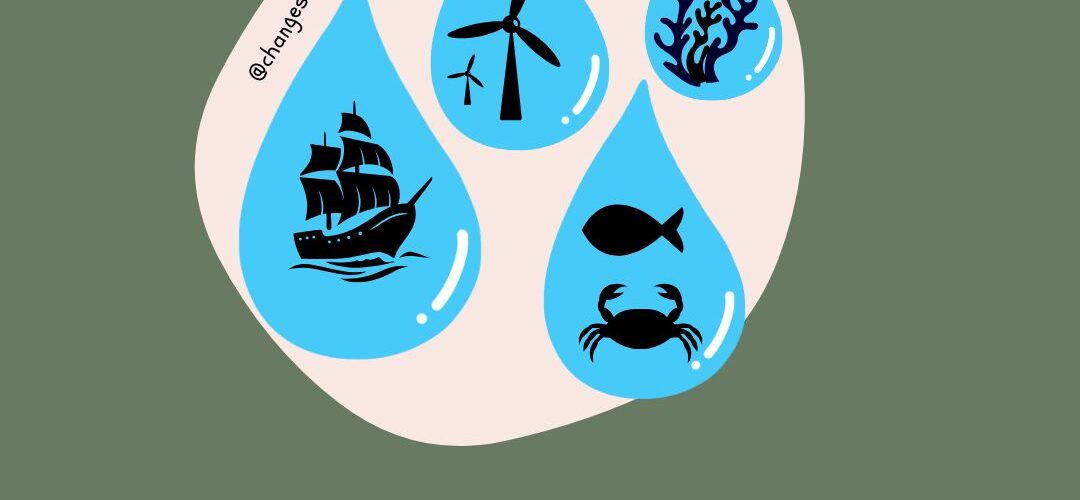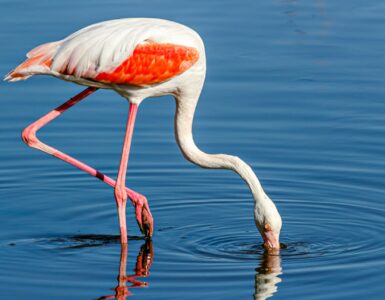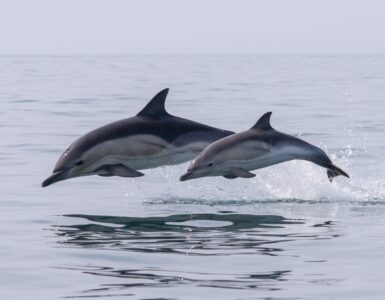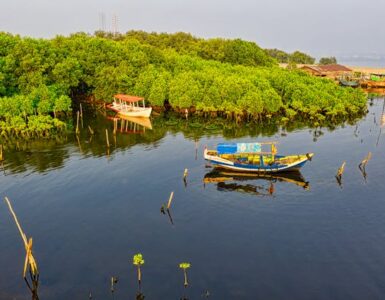The blue economy, an evolving concept, envisions a sustainable ocean-based economic model. Encompassing diverse activities linked to oceans, seas, and coasts, it seeks to balance economic growth with the crucial preservation of marine ecosystem health and resilience.
While a universally accepted definition remains elusive, the blue economy broadly promotes the sustainable use of ocean resources for socioeconomic benefit, including job creation, poverty reduction, and responsible ocean stewardship.
This holistic approach integrates economic prosperity with environmental sustainability and social equity.
Let us dive deeper into this article.
About Blue Economy

The blue economy presents many potential benefits, from improved governance of marine ecosystems and significant emissions reductions to enhanced health standards and a stronger defence against climate change.
One particularly promising area is the rapid growth of renewable ocean energy sectors, especially offshore wind, including the exciting potential of floating turbine technology.
Beyond offshore wind, the blue economy encompasses diverse promising sectors. These include offshore aquaculture, harnessing the power of wave and tidal energy, responsible seabed mining, and the innovative field of blue biotechnology, which leverages marine organisms for advancements in healthcare and energy.
Even established industries like shipping, tourism and fisheries can contribute by adopting greener technologies and pursuing sustainable expansion.
The ocean industry is a rapidly growing sector, however, this growth often comes at the cost of marine ecosystems and the communities reliant upon them, leading to ecological degradation and resource depletion.
While Sustainable Development Goal 14, “Life Below Water,” promotes ocean conservation and sustainable use with seven targets for 2030, progress has been limited.
However, governments and companies are increasingly exploring ocean-based nature-based solutions like carbon sequestration and coastal protection, marine environments receive only 9% of total nature-based solution investments.
Strategies Across the World
Recognizing the importance of this approach, countries are developing comprehensive, long-term strategies to foster sustainable, climate-resilient, and inclusive blue economy policies.
● Kenya: The blue economy is central to Kenya’s “Vision 2030,” focusing on offshore tuna fisheries, seaweed farming, port development, shipping, and tourism.
● Vietnam: While a relatively new concept, Vietnam has local initiatives like the Binh Thuan Fisheries Association’s community management program, which successfully restored clam fisheries and increased fisher incomes.
● Samoa: Samoa’s 2020 Ocean Strategy aims to develop the blue economy, including a commitment to protect 30% of its ocean by 2025 and support for marine spatial planning and sustainable fisheries.
● India: With a vast coastline, India’s blue economy is growing, with initiatives like deep-sea exploration for resources.
● China: An early adopter, China has implemented initiatives like seagrass bed restoration in Chudao to support sea cucumber aquaculture.
● Trinidad and Tobago: This Caribbean nation is part of a regional push for sustainable blue economy development, emphasizing cross-sector policies and strong institutional regulation.
● Tunisia: Currently developing a national strategy, Tunisia has significant incentives due to its large coastal population dependent on marine resources.
● Gambia: Gambia has a 10-year plan, supported by the FAO and EU, to promote sustainable growth and female employment in its mangrove oyster fishery sector.
● Portugal: Portugal has actively promoted its blue economy since 2015, recently receiving substantial EU funding for sustainable fisheries and aquaculture.
● Costa Rica: Rich in marine resources, Costa Rica is developing its blue economy through sustainable fisheries and marine tourism.
Witnessing nations worldwide recognise the ocean’s potential to reduce coastal poverty and boost economic performance is refreshing. It is anticipated that existing and developing strategies will contribute to improved global ocean management, benefiting both people and the environment.
Navigating uncharted waters
The blue economy, while promising, faces key challenges.
To understand the environmental and socioeconomic dimensions of the blue economy a stable economy, long-term planning, equitable development and scientific advancements are required. Supporting the transition to a blue economy requires concerted effort.
While many nations are pursuing greener agendas through ocean economic development, significant challenges remain. Governments must dedicate resources to investing in modern infrastructure, technologies, R&D, education, and job creation to facilitate this transition.
Shifting away from traditional economic models will be demanding, necessitating international collaboration, knowledge sharing, and joint research to ensure sustainable blue economies.
Further, governing the interconnected ocean ecosystem is complex due to the multitude of stakeholders and the potential for localized environmental damage to have widespread effects.
Overall, the blue economy has gained prominence over the past decade as the economic potential of the ocean and its resources has become increasingly recognized. It bridges the gap between human activity and the marine environment.
While coastal communities have long relied on ocean resources, the blue economy represents a deliberate and integrated sustainable development strategy that mainstreams the ocean into all economic levels, from local to national.
What makes seaweed an important marine plant in the blue economy? Read more
How the shipping industry is becoming climate-friendly. Read here.






Add comment